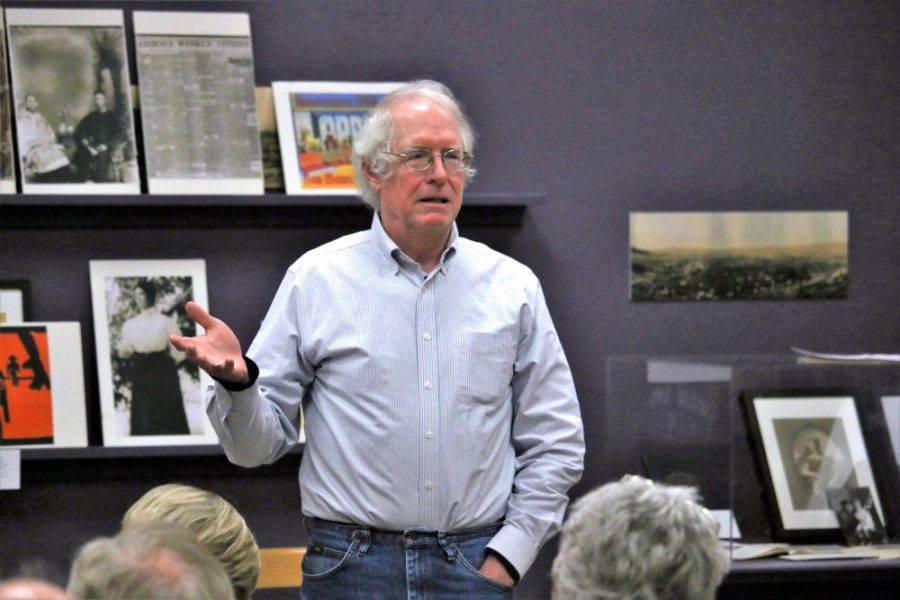There are many ways to spend a Friday evening, but one UA museum hopes to bring something different with their special programming. The Arizona Historical Society Libraries and Archives provides the public with an opportunity to learn about the history of Tucson and Arizona all week. A social educational event called First Fridays at the Arizona History Museum provides guests the chance to explore that history on the cheap.
While the Arizona History Museum reduces their admission prices from $8 to $3 every Friday, people who attend the museum on the first Friday of the month get in for free.
The program always features a special presentation that educates guests about history, such as a lectures, music events or even a quilt show. People can also mingle with others who share an interest in history.
Mary Ann Ruelas, an educator at the Arizona Historical Society, calls the event a gift to the community. Her role involves “education interpretation,” which consists of training volunteers to provide tours of the museum, reaching out to people and helping to make connections “so people can come in.” She also organizes First Friday events.
What began as a tentative plan soon became a stable and established event that regular Tucsonans steadily attend, according to Ruelas. On the first Friday of the month, people can rely on the museum for programs that will teach them more about a Tucson that once was.
RELATED: UA Museum of Art exhibition looks at the U.S.-Mexico border
“That was part of our way to say thank you to our community,” Ruelas said. “We don’t have any problem getting in visitors, but it’s the local community. A lot of people came here as kids [as] part of a fourth-grade tour and haven’t been back since then.”
First Fridays are a way to attract people into finally returning.
This month’s First Friday program included a lecture by Dave Devine, “Tracing Tucson’s Past.” He wrote a book called, “Tucson: A History of the Old Pueblo from the 1854 Gadsden Purchase.” He has also written for the opinion column in the Tucson Weekly.
In this lecture, Devine spoke about Tucson’s history, specifically things that occurred in the 19th century. This included accounts of snakes, the introduction of electricity in Old Main at the UA, the impact of the railroad and important figures of the time, such as Estevan Ochoa.
Devine read articles about these topics from newspapers of the past, including the Arizona Daily Citizen. Back during those times, information could only be found in newspapers, according to Devine. He searched for his information in the research library at the Arizona Historical Society.
Devin also spoke about Jim Ayres, an archaeologist who also referred to old newspapers using the microfilm machine at the Arizona Historical Society to do research. He would read the papers then make notes which he put together in a data collection system, Devine said.

“You would save so much more time with the index that Ayres created,” he said.
RELATED: Beer, Food and History at History on Tap
According to Devine, the index should be out by the end of next month in the Arizona Historical Society’s research library.
Devine recognizes the importance of having a place where people can go to learn about history.
“This event hopefully will attract people people who will find out about the resources around here, like in this [Arizona Historical Society] library,” he said.
He said First Friday is good at getting people’s attention because it allows them to discover interesting history through participation, rather than resorting to the dry accounts he said some historical papers offer.
“If you have stories about snakes, if you have stories about lighting the Old Main, then people can relate to that and that makes it more likely that people will understand the changes that are occurring,” Devine said.
His belief is that if you understand history, you can then understand the present.
Mark O’Hare was an attendee of this month’s event and values the importance it holds in the Tucson community. He is an attorney who volunteers at the Arizona Historical Society and the Kino Heritage Society. He is also a Father Kino aficionado.
According to O’Hare, First Friday events are a good way to get people interacting and away from their phones.
“This is a wonderful way to get together and get people interested in different aspects,” O’Hare said. For him, this is a way to get a real experience out of history.
“History is not just the great men and the great women; it’s everyday people,” Ruelas said.“We’re the ones who make history, and that’s what Dave was talking about. History is never told.”
Through First Fridays at the Museum, people can make that connection that allows them to relate to the everyday figures of history.
The next First Friday takes place March 3 at 6 p.m.
Follow Melissa Vasquez on Twitter.









